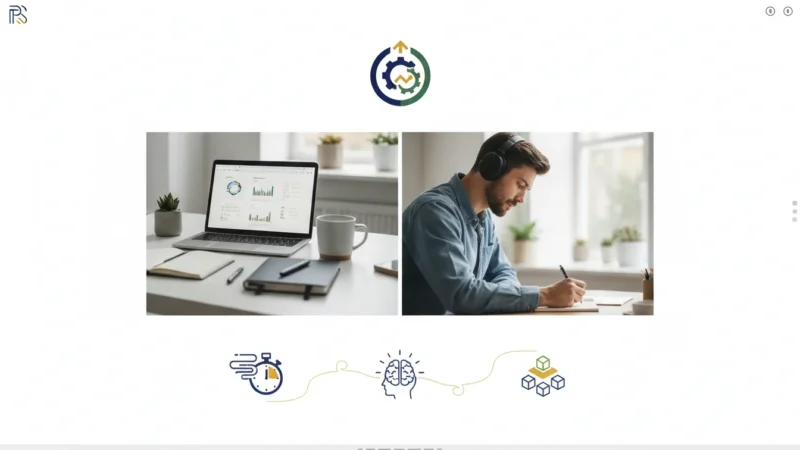
Left unchecked, this exhaustion often leads to a cycle of overcoming procrastination just to complete the most basic daily requirements.
Does your to-do list feel less like a plan and more like a threat? Do you end your day feeling busy but not productive, like you ran a marathon just to stay in the same place? If you’re nodding along, you are not alone. That heavy, draining feeling has a name: task fatigue. It’s the mental exhaustion that sets in when your brain is overloaded, your attention is fragmented, and you’re constantly switching gears. This is more than just feeling tired; it’s a deep sense of being mentally swamped, and it can make even simple tasks feel impossible.
Many people believe the solution to feeling overwhelmed at work is to push harder, to work longer, or to find a magical productivity app. But often, the opposite is true. The path to clarity and focus isn’t about adding more, but about subtracting the noise and adding intentional structure. It’s about understanding how your attention actually works and building a system that supports it, rather than fights against it.
At TheFocusedMethod.com, we believe that focus is a skill you can cultivate. It’s a muscle you can train. This isn’t about finding more willpower. It’s about reducing the need for it. This guide is your starting point. We’re not going to give you a list of a hundred productivity hacks that will only add to your feeling of being overwhelmed. Instead, we’ll give you a small set of powerful, evidence-aware focus rituals and mental tools. These are simple practices designed to calm the chaos, reduce mental friction, and help you regain control of your day.
You can move from a state of constant reaction to one of quiet intention. You can learn how to manage task fatigue and rediscover the satisfaction of deep, meaningful work. Let’s begin the journey from overwhelmed to on track, together.
📚 Table of Contents
- Understanding Your Attention: Why You Feel So Drained
- Four Focus Rituals to Reclaim Your Day
- 1. The Startup Ritual: Prime Your Brain for Focus
- 2. The Deep Work Entry Ritual: Master the Art of Monotasking
- 3. Break Hygiene: Recover and Recharge Intelligently
- 4. The Shutdown Ritual: End the Day with a Clear Mind
- Your 15-Minute Starter Pack
- Thought Tools: Shifting Your Mindset from Friction to Flow
- 1. Reframe Perfectionism as Progress
- 2. Actively Reduce Friction
- 3. Script Your Reset After Derailment
- Worked Examples: Putting It All into Practice
- Frequently Asked Questions About Focus and Fatigue
- Is it better to work in silence, or with music or white noise?
- I feel like I’m good at multitasking. Is it really that bad?
- What should I do when my motivation completely disappears?
- How can I stop thinking about work in the evenings?
- Conclusion: Your 7-Day Challenge to Beat Task Fatigue

Understanding Your Attention: Why You Feel So Drained
Before we can fix the problem, we need to understand it. Why does your brain feel so scattered? Why do some days feel like you’re wading through mental mud? The answer lies in how our brains handle information and energy. Think of your attention as a finite resource, like a battery. Every single decision you make, every notification you check, and every task you switch between drains a little bit of that battery.
If your working memory feels maxed out, utilizing a brain dump session can immediately lower your cognitive load by externalizing those nagging thoughts.
Much of this mental exhaustion stems from the difference between being busy and being productive, where movement is often mistaken for actual progress.
A key concept here is cognitive load. In simple terms, cognitive load is the total amount of mental effort being used in your working memory at any given moment. Imagine your brain’s working memory is like the RAM on a computer. If you have too many programs open, the computer slows down, lags, and might even crash. Your brain works the same way. When you’re trying to remember a long to-do list, field emails, listen to a podcast, and prepare for a meeting, you’re maxing out your cognitive load. The result is mental fog, difficulty concentrating, and that profound sense of task fatigue.
Another major energy drain is context switching. This is the mental cost your brain pays every time you shift your focus from one unrelated task to another. You might think jumping from an email to a spreadsheet and back again is harmless. But research suggests it’s incredibly inefficient. Each time you switch, your brain has to shut down the context of the old task and load up the context for the new one. This process isn’t instant. It takes time and, more importantly, it consumes precious mental energy. Even a few seconds of interruption can derail your concentration for several minutes. A day filled with constant context switching is a recipe for exhaustion and feeling overwhelmed at work.
Finally, our energy isn’t constant. We operate in natural rhythms, often called ultradian rhythms, which are 90-to-120-minute cycles of high-frequency brain activity followed by a period of lower-frequency activity. During the high-energy peak, you’re primed for focus and deep work. During the trough, your brain needs a rest to consolidate information and recover. When we ignore these natural rhythms and try to force ourselves to maintain high focus for hours on end, we’re fighting our own biology. This is like trying to sprint a marathon. It leads directly to burnout and makes task fatigue inevitable.
Understanding these three forces—cognitive load, context switching, and energy rhythms—is the first step. You’re not lazy or undisciplined. Your brain is simply being asked to do too much, too often, in a way it wasn’t designed for. The solution isn’t to force it harder; it’s to work smarter by creating systems that respect these limitations.


Four Focus Rituals to Reclaim Your Day
Knowledge is one thing, but action is what creates change. The most effective way to manage task fatigue is to build a predictable structure into your day. Rituals are powerful because they turn beneficial behaviors into habits, reducing the amount of decision-making and willpower you need. Instead of constantly deciding what to do next, you can rely on a simple, repeatable routine. Here are four core rituals to help you manage your energy and attention.
Beyond rituals, learning how to batch your tasks can further protect your mental battery by grouping similar activities together.
By automating these parts of your day, you can effectively beat decision fatigue and save your mental energy for what matters.

1. The Startup Ritual: Prime Your Brain for Focus
How you start your day sets the tone for everything that follows. Many people begin their workday by immediately opening their email inbox. This is a defensive move. It instantly puts you in a reactive state, letting other people’s priorities dictate your agenda. A startup ritual, in contrast, is a proactive practice designed to create clarity and intention before the chaos begins.
Your startup ritual doesn’t need to be long or complicated. It’s a 5-to-15-minute routine to transition from “home mode” to “work mode.” It should clear your workspace and your mind. It might include tidying your desk, getting a glass of water, and reviewing your calendar. The most crucial component is to identify your 1-3 Most Important Tasks (MITs) for the day. These aren’t just urgent items; they are the tasks that will move your most important projects forward. By defining your wins for the day upfront, you create a clear target for your attention.

2. The Deep Work Entry Ritual: Master the Art of Monotasking
The hardest part of deep work is often just getting started. A deep work entry ritual is a simple, 2-minute routine that signals to your brain that it’s time to focus. This is where you intentionally minimize distractions to support monotasking—the practice of focusing on one single thing at a time. True productivity comes from single-tasking, not multitasking.
Before starting a focus-intensive task, take a moment to prepare. Close all unnecessary tabs and applications on your computer. Put your phone on silent and move it out of your immediate line of sight. If possible, put on noise-canceling headphones. Take three deep breaths. This small sequence of actions acts as a trigger. Over time, your brain learns that this ritual means a period of sustained, uninterrupted concentration is about to begin. It dramatically reduces the friction of starting and helps you enter a state of deep focus more quickly.

3. Break Hygiene: Recover and Recharge Intelligently
Breaks are not a sign of weakness; they are a biological necessity for high performance. As we learned, your brain operates in cycles. Pushing through a natural energy trough is counterproductive. Instead, you need to practice good break hygiene. This means taking intentional, restorative breaks, not just scrolling through social media, which can often increase cognitive load rather than reduce it.
A good break involves disconnecting from your work both physically and mentally. The Pomodoro Technique, which involves working for 25 minutes and then taking a 5-minute break, is a popular framework. During your 5-minute break, stand up. Stretch. Walk around the room. Look out a window at something in the distance to rest your eyes. Hydrate. The key is to do something that uses a different part of your brain and body. This allows your prefrontal cortex, the part of your brain responsible for executive functions like focus and decision-making, to rest and recharge. Taking these small, frequent breaks prevents task fatigue from building up over the course of the day.

4. The Shutdown Ritual: End the Day with a Clear Mind
Just as important as how you start your day is how you end it. A shutdown ritual creates a clear boundary between your work life and your personal life. Without it, work can bleed into your evening, and you may find yourself ruminating on unfinished tasks, which prevents true recovery. The goal is to close the mental loops of the day so you can fully disconnect.
Your shutdown ritual, like your startup ritual, should be short and consistent. Spend the last 10-15 minutes of your workday reviewing what you accomplished. Migrate any unfinished tasks to a trusted place, like tomorrow’s to-do list or your project management software. Briefly plan your top priority for the next day. This ensures you can start tomorrow with momentum. Finally, tidy your physical desk and close all your work-related tabs. You can even say a phrase out loud, like “Shutdown complete,” to signal to yourself that the workday is officially over.

Your 15-Minute Starter Pack
Feeling overwhelmed by new routines? Start small. Here’s a simple 15-minute plan you can implement tomorrow:
- 5-Minute Startup: Tidy your desk. Write down your single most important task for the day.
- 5-Minute Break: After your first solid hour of work, get up, stretch, and drink a glass of water. Do not check your phone.
- 5-Minute Shutdown: At the end of the day, write down the first thing you’ll do tomorrow. Close your computer.
Commit to just this for one week. You’ll be amazed at the sense of control and calm it can bring to your day.


Thought Tools: Shifting Your Mindset from Friction to Flow
The systems and rituals we use are only half the battle. Our internal mindset—the stories we tell ourselves and the beliefs we hold—plays an enormous role in creating or alleviating the feeling of being overwhelmed. When you’re stuck in patterns of perfectionism or negative self-talk, even the best productivity system will fail. Here are three powerful mental models to help you shift your thinking.

1. Reframe Perfectionism as Progress
Perfectionism is a primary driver of task fatigue. It keeps you from starting tasks (“I don’t know how to do it perfectly yet”) and from finishing them (“It’s not good enough to be done”). This creates a backlog of open loops in your mind, which dramatically increases cognitive load. The antidote is to shift your goal from perfection to progress.
Instead of aiming for a flawless outcome, aim for a “good enough” first version. Give yourself permission to produce a rough draft. Remind yourself that “done is better than perfect.” A powerful reframe is to change your internal script. When you hear the voice saying, “This has to be perfect,” counter it with, “This just has to be finished for now.” Or, “What is one small step I can take to move this forward?” This mindset shift breaks the paralysis of perfectionism and allows you to build momentum, which is the fuel of productivity and motivation.

2. Actively Reduce Friction
Our brains are wired to follow the path of least resistance. When a task feels difficult or complicated, we are more likely to procrastinate on it. Instead of trying to muster more willpower to overcome this resistance, strategically reduce the friction associated with your important tasks. Make it easier to do the right thing and harder to do the wrong thing.
If you want to focus on a report, reduce the friction of starting by gathering all your research materials the day before. Close all other tabs. If you want to avoid checking your phone, reduce the friction of that habit by putting your phone in another room. Conversely, add friction to your distractions. Log out of social media accounts. Uninstall distracting apps from your phone. By thoughtfully designing your environment, you conserve your limited willpower for the work itself, rather than for fighting temptation. This small change can have a massive impact on your ability to enter a state of flow, which experts describe as a state of being fully immersed and energized in an activity. It’s that feeling of being “in the zone,” where work feels effortless. For more on psychological concepts, resources from the American Psychological Association can be helpful. You can find them at their homepage: https://www.apa.org.

3. Script Your Reset After Derailment
No matter how good your system is, you will get distracted. You will have an off day. You will fall down a rabbit hole of unimportant emails. This is not a failure; it’s a normal part of being human. The difference between a productive day and a frustrating one is often how quickly you get back on track after a derailment. The key is to avoid the shame spiral that often follows a distraction (“I’ve wasted so much time, the whole day is ruined”).
Create a simple, non-judgmental reset script for yourself. It’s a 3-step mental routine: Acknowledge, Accept, and Act.
- Acknowledge: Simply notice that you’ve gone off track. Say to yourself, “Okay, I’m not working on my main task right now.”
- Accept: Do this without judgment. Don’t beat yourself up. “That’s okay. It happens. My attention wandered.”
- Act: Gently redirect your focus. Ask yourself, “What is the very next, smallest step I can take to get back to my priority?” It might be as simple as re-opening a document or writing a single sentence.
This simple script interrupts the cycle of guilt and frustration. It turns a moment of distraction from a catastrophe into a minor, correctable deviation. It’s a compassionate and effective way to manage your focus throughout the unpredictable reality of a workday.


Worked Examples: Putting It All into Practice
Theory is great, but let’s see how these principles apply to real-life situations. Here are two common scenarios that often lead to feeling overwhelmed at work and how you can navigate them using the tools we’ve discussed.

Scenario 1: The Tight Deadline Pressure Cooker
The Situation: It’s Tuesday afternoon, and you have a major project due by noon on Wednesday. You feel a rising sense of panic. Your to-do list seems endless, and every email that arrives feels like another distraction pulling you away from the one thing that truly matters. The pressure is making it hard to think clearly.
The Overwhelmed Response: You try to multitask, frantically jumping between drafting the report, answering “urgent” emails, and checking for new messages. You keep multiple documents open, trying to do everything at once. Your anxiety spikes, your work quality suffers, and you feel your energy plummeting.
The Focused Method Response:
- Invoke a Reset Script: You notice the panic. You pause. Acknowledge: “I’m feeling overwhelmed.” Accept: “This is a normal reaction to a tight deadline.” Act: “What is the most important thing to do right now?”
- Use the Startup Ritual (Mid-Day): You take 5 minutes to reset. You put an out-of-office reply on your email stating you’re in deep focus until the deadline and will respond later. You write down the 3-4 major steps needed to finish the project. This is your new, temporary to-do list. Everything else is ignored.
- Practice Monotasking and Break Hygiene: You use a timer. You commit to 45 minutes of focused work on the first step—and only the first step. Then, you take a 10-minute break away from your screen to stretch and hydrate. You repeat this cycle. By breaking the mountain of work into manageable, single-tasked chunks, you reduce cognitive load and build momentum. The structure of the work/break cycle contains the anxiety and keeps you on track.

Scenario 2: The Noisy, Distracting Home Environment
The Situation: You work from home, and today is particularly chaotic. There’s construction happening next door, your family members are in and out of your workspace, and the line between home life and work life feels completely blurred. You can’t seem to get a solid block of concentration.
The Overwhelmed Response: You get increasingly frustrated and irritable. You try to work through the noise, but find yourself re-reading the same paragraph over and over. You get angry at every interruption, which drains your emotional energy. You end up feeling resentful and unproductive.
The Focused Method Response:
- Reduce Friction and Add Boundaries: You accept that the environment is challenging and focus on what you can control. You put on noise-canceling headphones, even if you’re just playing white noise. You have a brief, explicit conversation with your family: “I need to be in deep focus for the next 90 minutes. Can you please only interrupt me if it’s a true emergency?” This creates a social boundary.
- Use a Deep Work Entry Ritual: Before starting your 90-minute block, you perform your ritual. You close all non-essential applications. You take a few deep breaths to signal to your brain it’s time to concentrate. This helps you mentally wall off the external chaos.
- Adjust Your Expectations and Reframe: You acknowledge that today won’t be a perfect 8-hour deep work day. You reframe your goal. “My win for today is to get two solid 90-minute focus blocks in.” This makes the goal feel achievable despite the circumstances. You celebrate those wins instead of focusing on the distractions, which protects your motivation and prevents task fatigue.

Frequently Asked Questions About Focus and Fatigue
As a focus coach, I hear many of the same questions from people struggling with task fatigue. Here are answers to some of the most common ones.
Is it better to work in silence, or with music or white noise?
There is no one-size-fits-all answer, as it depends on the person and the task. For highly creative or complex work that requires deep thought, silence is often best. However, for many people, especially in a noisy environment, a consistent, non-distracting audio background can be very helpful. The key is that the sound should be predictable and free of lyrics. Instrumental music, classical music, or ambient sounds like white or brown noise can mask distracting background chatter and help you enter a state of flow. The goal is to find a sound that your brain can easily tune out, allowing you to focus on the task at hand. Experiment to see what works best for you.
I feel like I’m good at multitasking. Is it really that bad?
This is one of the biggest myths of modern productivity. While it may feel like you’re doing multiple things at once, what your brain is actually doing is switching rapidly between tasks. This is the context switching we discussed earlier. A very small percentage of the population—sometimes called “supertaskers”—can handle this without a significant performance drop, but for the vast majority of us, it comes at a high cost. It increases the time it takes to complete tasks, dramatically increases error rates, and floods the brain with stress hormones. For work that requires any level of thought, monotasking is always more effective and less draining. Additional information on cognitive health can be found from sources like the National Institutes of Health, available at their homepage: https://www.nih.gov.
What should I do when my motivation completely disappears?
Motivation is a fickle emotion; it comes and goes. The mistake is waiting for motivation to strike before you take action. Productive people know that action often precedes motivation. When you feel zero motivation, fall back on your rituals and focus on the smallest possible step. Don’t think about writing the whole report; just open the document. Don’t think about the entire project; just complete the first 2-minute task. This is where reducing friction is key. Make the next action so ridiculously easy that you can’t say no. This often creates a tiny bit of momentum, which can be just enough to get the motivation engine started again.
How can I stop thinking about work in the evenings?
This is the exact problem the shutdown ritual is designed to solve. When your brain keeps replaying work problems, it’s usually because of open loops—undecided, unfinished, or uncaptured tasks. Your brain doesn’t trust that you won’t forget something important. The shutdown ritual closes these loops. By reviewing your day, capturing any lingering to-dos, and making a clear plan for tomorrow, you are effectively telling your brain, “I’ve got this handled. You can stand down.” Creating this hard stop is critical for psychological detachment, which is necessary for genuine rest and recovery, ultimately preventing long-term burnout and chronic task fatigue.


Conclusion: Your 7-Day Challenge to Beat Task Fatigue
We’ve covered a lot of ground, from the mechanics of attention to the practical rituals and mindsets that combat overwhelm. Remember, the goal is not to become a perfect, unfeeling productivity machine. The goal is to work in a way that is more aligned with your human biology, so you can end your days feeling accomplished and energized, not drained and defeated.
If you find yourself stuck at the starting line, understanding the science of overcoming procrastination can provide the extra push you need to take action.
For a deeper dive into sustainable habits, check out our complete guide to a more focused and productive week.
Feeling overwhelmed is a signal. It’s your mind and body telling you that your current approach isn’t sustainable. Learning how to manage task fatigue is not about adding more to your plate; it’s about creating structure, setting boundaries, and being intentional with your most valuable resource: your focus.
Knowledge is only potential. The real change comes from consistent action. To help you get started, I invite you to take on a simple 7-day challenge. Don’t try to implement everything at once. Just choose a few small actions and practice them every workday for one week.
Your Focus Actions for the Next 7 Days:
- Implement the 15-Minute Starter Pack. Commit to the 5-minute startup, one 5-minute restorative break, and the 5-minute shutdown ritual each day. This is your foundation.
- Practice Monotasking for One Hour. Choose one block of time each day—even just 30 or 60 minutes—to be a dedicated deep work session. Use a deep work entry ritual: close all distractions, silence your phone, and work on a single task.
- Use the Reset Script. When you inevitably get distracted, practice the “Acknowledge, Accept, Act” script. Do this without judgment. The goal is not to avoid distraction perfectly but to get better at recovering from it quickly.
Try this for just one week. Notice how you feel at the end of each day. You have the power to move from overwhelmed to on track. It starts not with a giant leap, but with one small, intentional step. You can do this.
Disclaimer: The information provided in this article is for informational purposes only and is not intended as a substitute for professional medical or psychological advice, diagnosis, or treatment. Always seek the advice of your physician or other qualified health provider with any questions you may have regarding a medical condition.
To clear your mental slate during this ritual, consider why you should start your day with a brain dump to capture distracting thoughts.
Pairing this with a digital wind-down routine can further ensure that work stress doesn’t interfere with your rest.











Leave a Reply